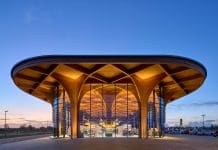The levelling up agenda is more than just a phrase, it is tangible progress. Joseph Daniels, founder of Etopia, says MMC housing can play a huge role in realising lasting change across Britain
As a result of my experience advising BEIS – Construct Zero and UKBCSD, I have learned that it isn’t always that people would listen to a vision of how things can be done better and more sustainability, and by sustainability I mean actively addressing the three pillars of providing more environmentally, economic and socially driven homes, buildings and communities.
Etopia was derived from these ideals, to drive the levelling up agenda, starting with the UK and expanding to a global scale, as there is a distinct lack of follow through, resulting in a lack of quality housing available, and a lack of levelling up, period.
I speak from my own personal experiences on these matters, a unique position to be in for a leader in our industry. A history that includes experiencing deprivation and poverty, moving from pillar to post in various types of social housing and sometimes having no shelter at all. I know what we develop and deliver as an industry does not provide what it needs. It is simply not good enough.
The levelling up agenda and need in our nation is real. The energy crisis is only accentuating something we already knew to be a harsh reality for far too many.
Five million people are facing fuel poverty in Britain
According to the Resolution Foundation, five million people in Britain are currently staring down the barrel of the fuel poverty gun, and yet there is something that can be done.
Developing and providing smarter, better engineered and designed buildings could be the backbone of how we level up, and not just as an industry but the nation, as we are the ones responsible for creating the safe havens (homes, workspaces and communities) of our nation.
It is also, surprisingly, the easiest.
Levelling up homes and utilising new technologies is a swift answer to energy independence, renewable progress and ultimately smarter buildings that lead to less poverty and dependence on foreign states and imports.

How can MMC help to address the problem?
To start with, MMC isn’t he prefab homes of the 50s nor is it modular. MMC is about MODERN methods of construction and from where we are standing, the solution is simple, something we like to refer to as ECITECH.
A combination of energy, construction and intelligent technologies, used in tandem, allowing us to A – build buildings from better materials, B – use efficiency energy systems that are powered by renewables and C (the most important of all), harness intelligence, otherwise known as IoT (the internet of things) and data.
It’s borderline insane that we have no idea, apart from a privately installed smart meter at the occupier’s discretion, of how our homes actually work. I say to people all the time you wouldn’t drive your electric self-driving vehicle 100 miles if it only had 50% charge, or you wouldn’t go on a 50-mile hike into the mountains with only 5% battery on your phone for GPS. So why do we build buildings that lack simple basic intelligence?
In every household, each room is used in a different way based on the person, and also affected by the external environment brought on by design, such as solar gains. However, the approach to all rooms and all buildings is the same, one size fits all rather than simply installing sensors and smart controls to allow the room to work around you and the planet.
Would this be acceptable in any other market? Yet, the dumbest thing we buy is the most expensive thing we save up for (a home). This is why levelling up in the housing sector with MMC or Proptech/ECItech is crucial. It supports future planning and infrastructure; it can inform us and by using smart tech, help us increase understanding based on real data – and it’s not like we are entering the unknown. Samsung, the biggest tech company in the world, has been progressing in this area for over a decade. Apple and Amazon have been unlocking homes literally by RING(ing) your doorbell, letting themselves in and having you pay for the luxury.
Yet nowhere does it state that any technology or intelligence should be used to help make key decisions of the most long-term assets our society creates. This is what levelling up for the industry can do and why including this statement will unlock the potential of our sector.
There are examples of this entering the market, but they are new and fresh, and being met with many who don’t want the costs of better building materials, renewable energy systems and smart technologies. We seem to have quickly forgotten in 2015 the Code for Sustainable Homes was abolished, led by the private sector, something that was labelled “too expensive” and “not worth it”.
They say hindsight is a wonderful thing, given the current energy crisis situation and the poverty effect this is having on our nation, would the same decision makers look back seven years and still believe it the right thing, or would they witness the 1.4m households who are suffering in poorly built, thermally inefficient homes, when this could have been avoided with better regulations, sooner and realise the mistake made.
That equates to 3.36m (or 2.4 people per household) people who rather than being stressed, anxious, concerned that they may experience poverty due to their homes costing so much to run, could be comfortable in well built homes. This is a crisis that could have easily been averted. Yet, I ponder, the naysayers who said it was too expensive to do or that the environment wasn’t important, are they fearful of their next bill? Or worried of floods and mass migration? Unlikely.
People have this perception of MMC, pre-fabrication of the 1950s and 1960s or big modules being craned in on site, but they couldn’t be more wrong. MMC is advancing at a rapid rate due to the integration of technology, live sensing and decarbonising heating methods and a A/A+ rating MMC home can save up to two-thirds in bills if used correctly.
After the energy price cap lifted on 1 April for around 22m customers, those on default tariffs paying by direct debit will face an annual energy bill of £1,971, according to Ofgem.
Over a 25-year mortgage, that’s £49,275 over the mortgage life (at the current rate with no more increases). Therefore, an MMC home could save you up to £32,850.
Levelling up can stop us making the mistakes of the past
It begs the question, who is not building better at a small cost that is coming down benefitting? The consumer, or someone else?
It is not all doom and gloom. While this crisis has happened, one which I would refer to as a humanitarian crisis that could have been averted, the good news is that levelling up can stop us making the mistakes of the past.
Work led by visionaries and organisations who fought against the tide have started to create the path. Britain has some of the most wonderful regeneration projects in the world, Argent’s Kings Cross and Capital & Centric’s projects all across Manchester and the North West, such as Ducie Street Warehouse and Littlewoods.
Councils are also taking drastic steps. Bradford, which was number one on the Levelling Up Opportunity Index is in the finals of the City of Culture awards and there is key regeneration happening across the city, with the local communities already seeing the benefits of what levelling up can do.
We have the people and examples on these shores (myself and Etopia included) who are setting the standard for the next generation and with this now finally starting to become mainstream via mechanisms such as the SEC Sustainable Homes Matrix and the Future Homes Standard in 2025, the progress is being made and we should be grasping it with both hands.
But don’t be fooled that MMC is expensive or not ready: this isn’t the truth. The truth is MMC builds-in resilience for people and communities to avert the crisis in performance, energy and quality before it’s happened.

Joseph Daniels
Founding CEO
Etopia
Tel: +44 (0)20 3781 8444














